高中英语人教版必修五unit1单词讲解与拓展
- 格式:pptx
- 大小:540.13 KB
- 文档页数:34

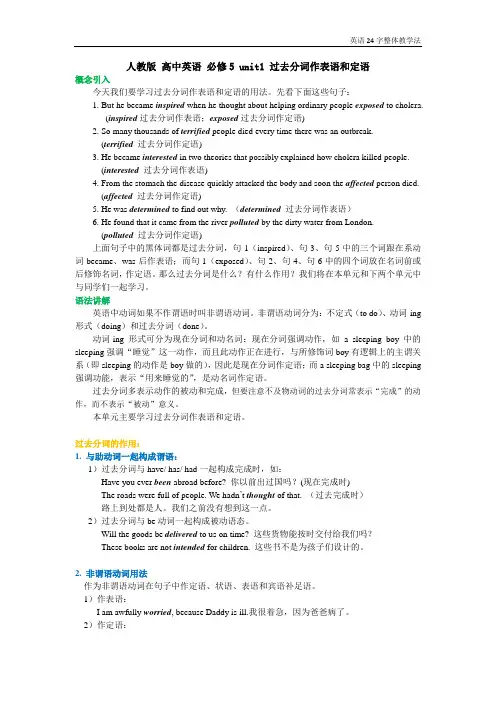
人教版高中英语必修5 unit1 过去分词作表语和定语概念引入今天我们要学习过去分词作表语和定语的用法。
先看下面这些句子:1. But he became inspired when he thought about helping ordinary people exposed to cholera.(inspired过去分词作表语;exposed过去分词作定语)2. So many thousands of terrified people died every time there was an outbreak.(terrified过去分词作定语)3. He became interested in two theories that possibly explained how cholera killed people.(interested 过去分词作表语)4. From the stomach the disease quickly attacked the body and soon the affected person died.(affected过去分词作定语)5. He was determined to find out why. (determined过去分词作表语)6. He found that it came from the river polluted by the dirty water from London.(polluted过去分词作定语)上面句子中的黑体词都是过去分词,句1(inspired)、句3、句5中的三个词跟在系动词became、was后作表语;而句1(exposed)、句2、句4、句6中的四个词放在名词前或后修饰名词,作定语。
那么过去分词是什么?有什么作用?我们将在本单元和下两个单元中与同学们一起学习。
语法讲解英语中动词如果不作谓语时叫非谓语动词。
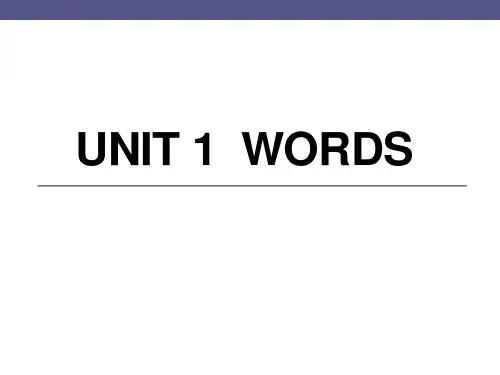
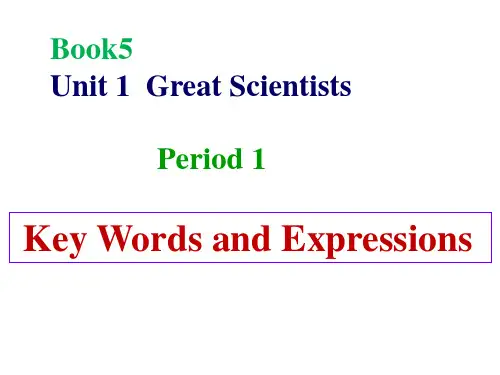
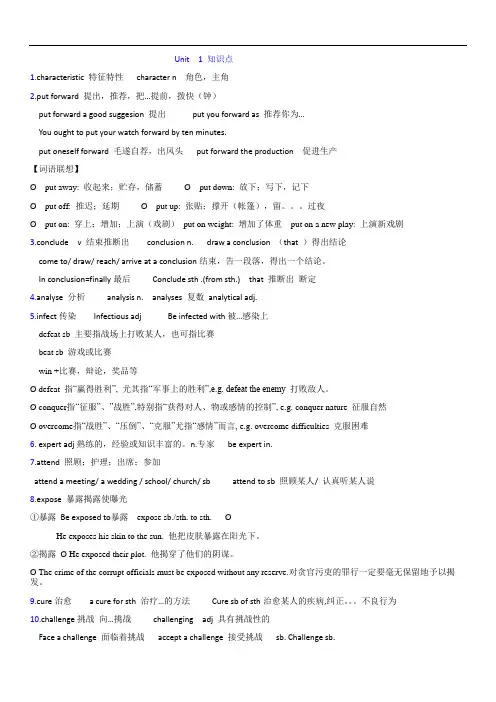
Unit 1 知识点1.characteristic 特征特性character n 角色,主角2.put forward 提出,推荐,把…提前,拨快(钟)put forward a good suggesion 提出put you forward as 推荐你为…You ought to put your watch forward by ten minutes.put oneself forward 毛遂自荐,出风头put forward the production 促进生产【词语联想】Ø put away: 收起来;贮存,储蓄Ø put down: 放下;写下,记下Ø put off: 推迟;延期Ø put up: 张贴;撑开(帐篷),留。
过夜Ø put on: 穿上;增加;上演(戏剧)put on weight: 增加了体重put on a new play: 上演新戏剧3.conclude v 结束推断出conclusion n. draw a conclusion (that )得出结论come to/ draw/ reach/ arrive at a conclusion结束,告一段落,得出一个结论。
In conclusion=finally最后Conclude sth .(from sth.) that 推断出断定4.analyse 分析analysis n. analyses 复数analytical adj.5.infect传染Infectious adj Be infected with被…感染上defeat sb 主要指战场上打败某人,也可指比赛beat sb 游戏或比赛win +比赛,辩论,奖品等Ø defeat 指“赢得胜利”, 尤其指“军事上的胜利”,e.g. defeat the enemy 打败敌人。
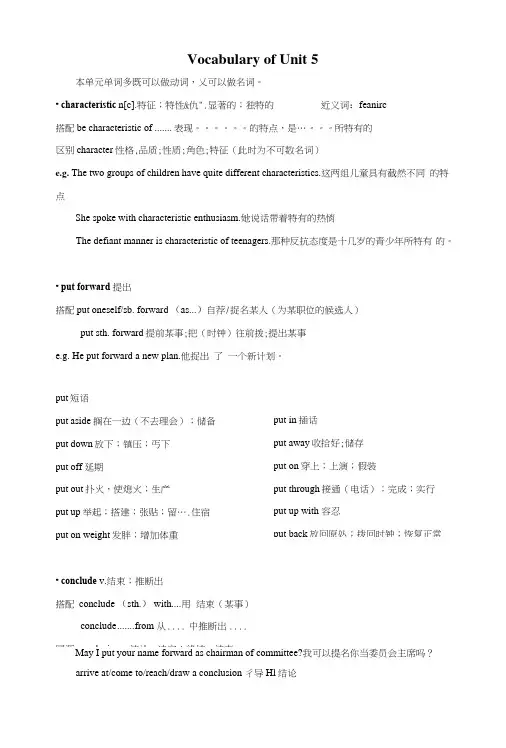
Vocabulary of Unit 5本单元单词多既可以做动词,乂可以做名词。
• characteristic n[c].特征;特性&仇".显著的;独特的 近义词:feanirc搭配be characteristic of ....... 表现。
的特点,是…。
所特有的区别character 性格,品质;性质;角色;特征(此时为不可数名词)e.g. The two groups of children have quite different characteristics.这两组儿童具有截然不同 的特点She spoke with characteristic enthusiasm.她说话带着特有的热悄The defiant manner is characteristic of teenagers.那种反抗态度是十几岁的青少年所特有 的。
• put forward 提出搭配put oneself/sb. forward (as...)自荐/捉名某人(为某职位的候选人)put sth. forward 提前某事;把(时钟)往前拨;提出某事e.g. He put forward a new plan.他捉出 了 一个新计划。
May I put your name forward as chairman of committee?我可以提名你当委员会主席吗?arrive at/come to/reach/draw a conclusion 彳导Hl 结论put 短语put aside 搁在一边(不去理会);储备put down 放下;镇压;丐下put off 延期put out 扑火,使熄火;生产put up 举起;搭建;张贴;留….住宿put on weight 发胖;增加体重 • conclude v.结束;推断出搭配 conclude (sth.) with....用 结束(某事)conclude ....... f rom 从 .... 中推断出 ....同源conclusion n.结论,决定;终结,结束 put in 插话 put away 收拾好;储存 put on 穿上;上演;假装 put through 接通(电话);完成;实行 put up with 容忍 put back 放回原处;拨回时钟;恢复正常in conclusion总而言之e.g. She concluded her speech with a quotation from Shakespeare.她引用莎士比亚的名言结束了演讲What do you conclude from that?从那你总结111 / 什么?I've come to the conclusion that he's not the right person for the job.我得出结论,他不是那份工作的合适人选In conclusion, walking is a cheap, safe, enjoyable and readily available form of exercise.总而言之,散步是一种便宜、安全、愉快、方便的锻炼方式•defeat v.打扮;战败;使受挫;n.失败辨析beat/defeat/winbeat/defeat的宾语是人或某个集体。
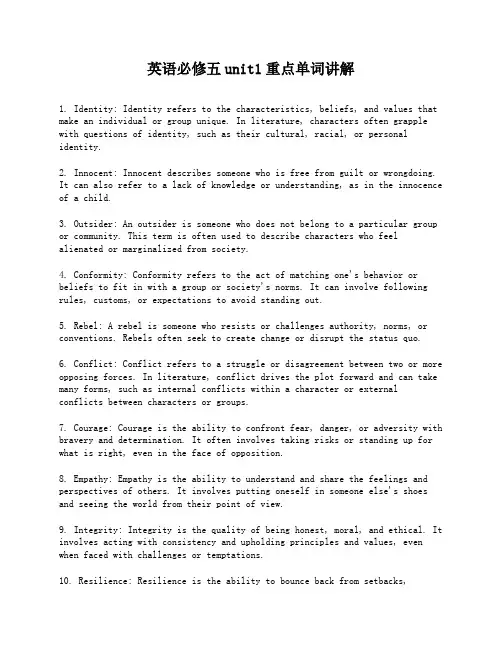
英语必修五unit1重点单词讲解1. Identity: Identity refers to the characteristics, beliefs, and values that make an individual or group unique. In literature, characters often grapple with questions of identity, such as their cultural, racial, or personal identity.2. Innocent: Innocent describes someone who is free from guilt or wrongdoing. It can also refer to a lack of knowledge or understanding, as in the innocence of a child.3. Outsider: An outsider is someone who does not belong to a particular group or community. This term is often used to describe characters who feel alienated or marginalized from society.4. Conformity: Conformity refers to the act of matching one's behavior or beliefs to fit in with a group or society's norms. It can involve following rules, customs, or expectations to avoid standing out.5. Rebel: A rebel is someone who resists or challenges authority, norms, or conventions. Rebels often seek to create change or disrupt the status quo.6. Conflict: Conflict refers to a struggle or disagreement between two or more opposing forces. In literature, conflict drives the plot forward and can take many forms, such as internal conflicts within a character or externalconflicts between characters or groups.7. Courage: Courage is the ability to confront fear, danger, or adversity with bravery and determination. It often involves taking risks or standing up for what is right, even in the face of opposition.8. Empathy: Empathy is the ability to understand and share the feelings and perspectives of others. It involves putting oneself in someone else's shoes and seeing the world from their point of view.9. Integrity: Integrity is the quality of being honest, moral, and ethical. It involves acting with consistency and upholding principles and values, even when faced with challenges or temptations.10. Resilience: Resilience is the ability to bounce back from setbacks,adversity, or difficult situations. It involves adapting to change, staying positive, and finding ways to overcome obstacles.11. Adversity: Adversity refers to difficulties, challenges, or obstacles that one may face in life. It can include hardships such as poverty, illness, or loss, and often tests one's resilience and character.12. Prejudice: Prejudice is a preconceived opinion or judgment about someone or something, usually based on stereotypes or incomplete information. Prejudice can lead to discrimination and unfair treatment of individuals or groups.13. Empowerment: Empowerment is the process of giving individuals or groups the authority, resources, and opportunities to take control of their own lives and make positive changes. It involves building confidence, skills, and self-esteem.14. Segregation: Segregation is the enforced separation of different racial, ethnic, or social groups, often through laws or policies. Segregation can lead to inequality and division within society.15. Oppression: Oppression refers to the unjust or cruel exercise of power and authority over others, often resulting in discrimination, exploitation, or mistreatment. It can take many forms, including systemic oppression based on race, gender, or class.16. Tolerance: Tolerance is the capacity to accept and respect the existence of opinions, beliefs, and behaviors that differ from one's own. It is a vital element in promoting understanding and harmony within diverse societies.17. Solidarity: Solidarity is the unity or agreement of feeling or action among individuals with a common interest or goal. It often involves standing together in support of a cause or in opposition to an injustice.18. Activism: Activism is the policy or action of using vigorous campaigning to bring about political or social change. Activists are often individuals who are passionate about addressing issues and advocating for change.19. Advocacy: Advocacy involves speaking, writing, or acting in support of a cause, policy, or person. An advocate is someone who actively promotes the interests or rights of others, often those who are marginalized or underrepresented.20. Altruism: Altruism is the selfless concern for the well-being of others.It is an unselfish action performed out of a desire to help, without any expectation of reward or recognition.21. Benevolence: Benevolence refers to the quality of being well-meaning, kind, and charitable. It is characterized by a desire to promote the happiness and welfare of others through acts of kindness and generosity.22. Enigma: An enigma is a person or thing that is mysterious, puzzling, or difficult to understand. In literature, enigmatic characters often have hidden depths or complexities that are gradually revealed over the course of a story.23. Isolation: Isolation is the state of being alone or apart from others. It can be a physical separation, but it can also refer to the feeling of being emotionally or socially isolated from others.24. Morality: Morality concerns principles of right and wrong behavior. It is the distinction between what is considered good or bad, right or wrong, in terms of an individual's conduct or character.25. Perseverance: Perseverance is the continued effort to do or achieve something despite difficulties, challenges, or setbacks. It is the steadfastness and determination to overcome obstacles and reach one's goals. 26. Renaissance: A renaissance is a period or movement marked by a revival of life, vigor, or interest in a particular area. It often involves a rediscovery or reevaluation of past achievements and a focus on innovation and progress. 27. Enlightenment: Enlightenment refers to the action of enlightening or the state of being enlightened. It is the process of gaining knowledge, understanding, and insight, often leading to personal growth and development.28. Liberation: Liberation is the act of setting someone free from oppression, confinement, or servitude. It can also refer to the feeling of being released from or relieved of burdens, constraints, or limitations.29. Renaissance: Renaissance is a cultural movement that spanned approximately from the 14th to the 17th century, characterized by a focus on humanism, a revival of classical learning and wisdom, and a commitment to the bettermentof society through education, arts, and sciences.30. Empiricism: Empiricism is the philosophical view that knowledge is derived primarily from sensory experience and observation. It emphasizes the importance of evidence and experimentation in the pursuit of understanding and truth.。


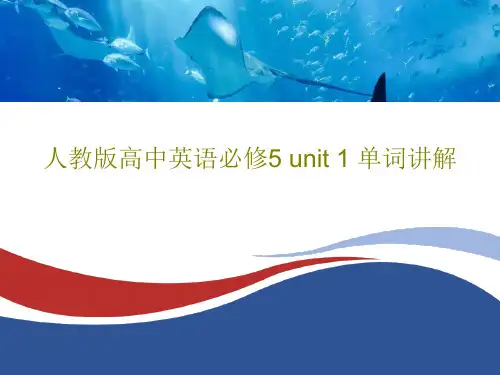
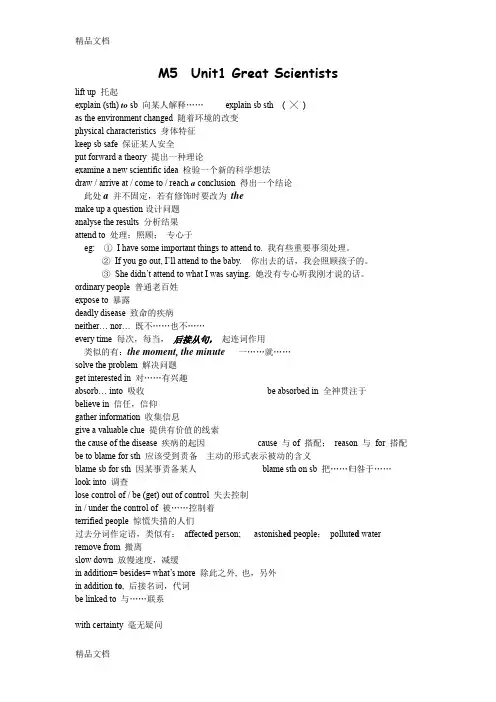
M5 Unit1 Great Scientistslift up 托起explain (sth) to sb 向某人解释……explain sb sth ( ╳)as the environment changed 随着环境的改变physical characteristics 身体特征keep sb safe 保证某人安全put forward a theory 提出一种理论examine a new scientific idea 检验一个新的科学想法draw / arrive at / come to / reach a conclusion 得出一个结论此处a并不固定,若有修饰时要改为themake up a question设计问题analyse the results 分析结果attend to 处理;照顾;专心于eg:①I have some important things to attend to. 我有些重要事须处理。
②If you go out, I’ll attend to the baby. 你出去的话,我会照顾孩子的。
③She didn’t attend to what I was saying. 她没有专心听我刚才说的话。
ordinary people 普通老百姓expose to 暴露deadly disease 致命的疾病neither… nor…既不……也不……every time 每次,每当,后接从句,起连词作用类似的有:the moment, the minute一……就……solve the problem 解决问题get interested in 对……有兴趣absorb… into 吸收be absorbed in 全神贯注于believe in 信任,信仰gather information 收集信息give a valuable clue 提供有价值的线索the cause of the disease 疾病的起因cause 与of 搭配;reason 与for 搭配be to blame for sth 应该受到责备主动的形式表示被动的含义blame sb for sth 因某事责备某人blame sth on sb 把……归咎于……look into 调查lose control of / be (get) out of control 失去控制in / under the control of 被……控制着terrified people 惊慌失措的人们过去分词作定语,类似有:affect ed person; astonish ed people;pollut ed water remove from 搬离slow down 放慢速度,减缓in addition= besides= what’s more 除此之外, 也,另外in addition to, 后接名词,代词be linked to 与……联系with certainty 毫无疑问prevent / stop / keep…. from doing sth 阻止做某事contribute to 有助于,促成make a contribution to 捐献,做出贡献come to an end 结束take up a new career 从事一项新的职业apart from 除……之外有两层含义:1. = besides 并未排除2. = except 真正意义上的排除在外make room for 腾出空间be strict with 对……严格lead to 通向,导致make sense 有意义,讲得通punish sb for sth 因……而惩罚某人work on 从事于,忙于at times 有时be enthusiastic for / about/ over sth 对某事很热情be cautious about sb/sth 对某人/某事谨慎only if 只有if only 如果……就好了→后面的句子常表示与现在或将来的事实相反,谓语动词要虚拟,用过去时态表示。
高中英语必修五Unit1重点单词积累以下是小编整理的关于人教版高中英语必修五单词及语言点总结:Unit 5 Theme parks,旨在提供综合运用所需材料!词汇学习是高中学习中的一个重要环节。
提高英语语言基本技能主要依靠词汇量的提升。
同学们应该掌握好所学的英语单词!高中英语必修五单词及语言点总结Unit 1 Great ScientistsWord usage1. attend v 1)to take care; give attention2) to be present at3) to take care of ; take part in; pay attention to sth; look afterHe did not attend the meeting yesterday.The school was attended almost entirely by local childrenThere was no one to attend him but Tina.She didn't attend to what I was saying.2. expose v 1) to make visible to2) to reveal the guilt or wrong doing ofThey consider it almost a crime to expose children to violence and sex on TV.Their scheme was exposed.Don't expose the film to light.Cleaning exposed the grain of wood.3. cure v. 1)bring a person back to healthn 2) curing and being curedAntibiotics help to cure many diseases that were formerly fatal.Penicillin cured him of pneumonia.You cured me completely.There's no known cure for a cold.She tried every means to cure her child of the bad habit4. absorb v :1) to occupy the full attention, or time2) take and suck in, take in heat and light etc.Cotton gloves absorb sweat.So many good ideas! It's too much for me to absorb all at once.The old man was utterly absorbed in the book.Small businesses are absorbed by big ones.She won't be able to absorb another heavy blow.5. contribute v 1) join with others in giving help, money etc.2) have a share inHe contributed half of his savings to the relief fund.He didn't contribute one idea to the documentHe contributed generously to the Red Cross.He never contributes to the discussionThe scientist often contributes to an academic journal6. control v. to exercise authoritative or dominating influence over; directn. to hold in restraint; checkShe is skillful enough to control the machine now.The British government at that time controlled the islandYou must learn to control your temper.They have no control over him.The helicopter landed with Joe at the controls.7. determine v. to reach a decision; resolveShe determined to go that very afternoonMy mom's encouragement determined me to go on with my study He was determined to win the gameThe court determined that the man was guilty of drunken driving.They have determined where the new school will be built.8. devote v. to give or apply entirely to particular activity, cause or a personHe devoted himself to writing.He was still devoted to the study of chemistryHe has devoted his whole life to benefiting mankind.9. confuse v. 1) to cause to be unable to think clarity or act with intelligence2) to assemble without order or sense; jumbleThey confused me by their conflicting adviceYou confused Australia with Austria.His granddaughter confused the papers on his desk.10. enthusiastic adj. Having or demonstrating enthusiasmDavid is very enthusiastic about the plan.They are enthusiastic admirers of that movie star.My parents are enthusiastic skiers.11. valuable adj. 1) worth of a lot of money2) having great usefulness or valueHe bought me a valuable diamond ring as a birthday present This experience is valuable to me.12. especially adv. 1) to extend or degree deserving of special emphasis2) particularly, in particularI liked all the children, Tom especially.We need to be especially careful.The book is compiled especially for beginners.13. conclude v. 1) to bring to an end; close2) to arrive at but the process of reasonWe concluded our meeting at 9 o'clock.What can you conclude from these observations?He concluded that he would wait a little longer.The meeting concluded after two hours.14. replace v. 1) to put back into a former position or place2) to take or fill the place ofShe replaced the receiver.The brakes have to be replaced.Electric lights have replaced candles.I will replace the cup I broke.15. puzzle n. 1) something that baffles or confuses2) something, such as a toy or game, that tests one’s ingenuityv. 3) to baffle or confuse mentallyWhat puzzles me is why they didn't show up.He looked a little puzzled.His recent behavior puzzles me.Her decision was a puzzle to him.16. admire v. to regard with pleasure, wonder, and approvalWe admire her for her diplomatic tact.He admires your poems very much.He admired her new hat.17. appear vi. 1) to become visible2) to seem or look to be3) to come before the publicGradually a smile appeared on her face.It appears they are right.He appeared to be talking to himself.The famous singer is appearing this fall at the Music Festival.Useful expressions1. put forward to offer( an idea, suggestion etc.) for considerationHe put forward a very good suggestion at the meeting.You ought to put your watch forward ten minutes.2. believe in 1) to accept as true or real2) to have a firm religious faith3) to have faith or trust inChristians believe in Jesus.We believe in him.Jim believes in fresh air and morning exercises.3. in addition adv. As well asThey eat a great deal of fruit in addition.In addition, the course also produces practical experience.4. deal with: do with, concern sthHe has learnt to deal properly with all kinds of complicated situations.This book deals with an important issue.I don’t know what they do with the problem=I don’t know how they deal with the problem5. make sense 1) to make sth understand or reasonable2) to have a clear meaning3) to be a wise course of actionThis sentence doesn't make sense.Your story doesn’t make sense to meHere, read the sentence. It doesn’t seem to make sense.6. base on: to use particular information or facts as a point from which todevelop an idea, plan, etc.This play is based on a true story.We should base our theory on facts.7. apart from: without considering; except forHe lives apart from his family.Apart from a few faults, he is a trustworthy teacher.Apart from the the cost, the dress doesn’t suit me.8. look into : to investigateWe will look into this matter together.9. join in 1) to participate with in an act or activity2) to become a part or member of3) to put sth togetherWill you join me in a walk?He jion the army.Where does the path join the road?Tie a knot to join those two piece of rope.10. go over 1) go examine2) to look at or examine for a purpose3) to repeatWe went over the building.We must go over the account s carefully before we settle down. GO over the lesson again。